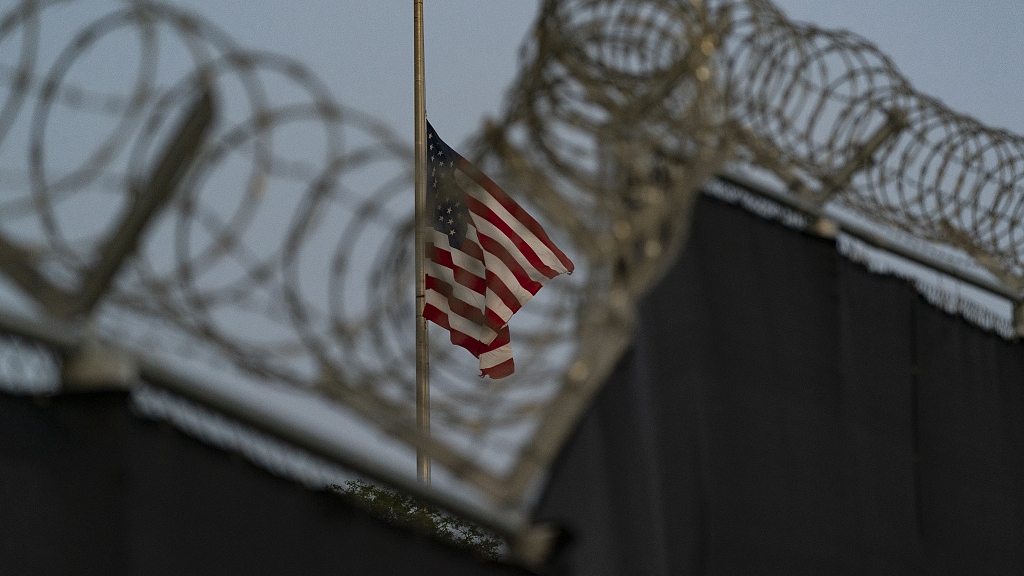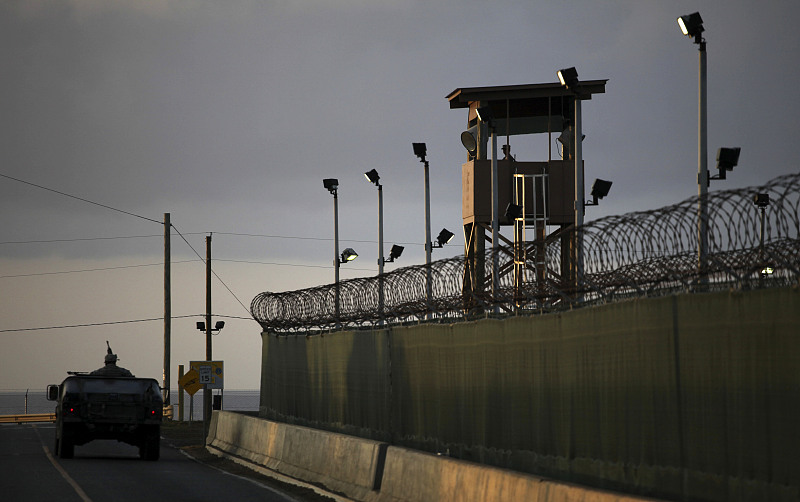
A U.S. national flag flies at half-staff as seen from Camp Justice in Guantanamo Bay Naval Base, Cuba, August 29, 2021. /CFP
A U.S. national flag flies at half-staff as seen from Camp Justice in Guantanamo Bay Naval Base, Cuba, August 29, 2021. /CFP
Editor's note: Bradley Blankenship, a special commentator on current affairs for CGTN, is a Prague-based American journalist, political analyst and freelance reporter. The article reflects the author's opinions and not necessarily the views of CGTN.
In the dark world of Guantanamo Bay, where the U.S. government's vice grip squeezes the lives of detainees, a recent breakthrough has been made. The United Nations human rights investigators were finally granted access to this infamous island prison, only to unveil a harrowing reality of "cruel, inhuman and degrading treatment."
With the report freshly released earlier this month, the dedicated UN monitor Fionnuala Ní Aoláin took the stage during a press conference with a tone laden with urgency and empathy. She painted a haunting picture of unending suffering endured by those confined for two long, agonizing decades. Each detainee bears the weight of relentless harm, a chilling consequence of systematic practices involving primarily torture and arbitrary detention.
Ní Aoláin's investigation delved deep into the lives of 34 inmates, their stories etched into her heart. However, as time passed, the number has since dwindled to 30 since her research was conducted in February. Although the report acknowledged U.S. President Joe Biden's administration for extending an olive branch by allowing UN investigators to access the camp, it did not shy away from highlighting the pressing human rights concerns that still persist.
A glimmer of hope flickers amidst the darkness, as, admittedly, the camp exhibits traces of progress: Improved sleeping accommodations, enhanced sanitation standards, regular meals and designated spaces for religious worship. Yet, beneath this thin veil of improvement lies a stark reality – detainees remain susceptible to unabated "human rights abuses."
Most disconcertingly, as highlighted in the report, 19 of the current captives, despite enduring decades of confinement, have never faced formal charges for their alleged wrongdoing. The problem has been compounded by the post-9/11 CIA torture program, which has become a barrier to detainees standing before a judge. Ní Aoláin insists that these men are still in custody because authorities refuse to face the consequences of the torture and ill-treatment they were subjected to, not because they pose an ongoing threat.
In essence, those trapped in limbo in this offshore prison are pawns in a game where the U.S. security state protects itself, avoiding accountability for its horrendous and unspeakable crimes. This glaring injustice strikes at the core, igniting profound concern and righteous indignation within the international community. The struggle persists as the world grapples with the anguish permeating the camp. The echoes of pain and desperate pleas for compassion challenge us to confront the darkness within the corridors of power and demand a brighter future for those condemned to lives of uncertainty.

A tower at the detention facility on Guantanamo Bay Naval Base in Cuba. /CFP
A tower at the detention facility on Guantanamo Bay Naval Base in Cuba. /CFP
Ní Aoláin declared that the use of torture at "Gitmo" is a profound betrayal of victims' rights. She calls for both an apology and a guarantee that such abuse will never be repeated. In response, the U.S. government's ambassador to the human rights council, Michele Taylor, defends the conditions of confinement, claiming they reflect the United States' respect for and protection of human rights. However, the implications of this statement point to the opposite realization – the detainees at Guantanamo embody Washington's disregard for the human rights of all inmates, albeit the most striking example.
The vast U.S. prison population, the largest in the world by far, is rife with systemic abuses, from cash bail injustices to solitary confinement that meets the UN's definition of torture and the extraordinary well-documented use of slave labor. For the U.S. to apologize for Guantanamo would also require the U.S. "criminal justice system" to apologize to its tens of millions of victims across the nation, and this is, of course, impossible. Likewise, because of the country's political system – including the widespread disenfranchisement of convicts – and the deep financial incentives to continue widespread imprisonment, there is a clear lack of political will or incentive.
Even still, an apology for Guantanamo would be only the tip of the iceberg. The U.S. owes all of its detainees much more – a fundamental overhaul of the criminal justice system. This calls for an end to cash bail, enshrining felons' political enfranchisement in federal law, banning slavery as a form of punishment, ending qualified immunity, ending unjust civil asset forfeiture, dropping the case against people like Julian Assange, bringing those in charge of the CIA torture program to justice and freeing inmates from Guantanamo Bay, returning the land to the Cuban government and paying reparations to those interned.
This historic UN trip to Guantanamo has finally opened the eyes of the international community, corroborating decades of media and eyewitness accounts. But there is far more work to be done to clean up Washington's human rights abuses and end its extraterritorial judicial practices. If the Biden administration wants to really show the world it's on the right track, it ought to press for radical criminal justice reform.
(If you want to contribute and have specific expertise, please contact us at opinions@cgtn.com. Follow @thouse_opinions on Twitter to discover the latest commentaries in the CGTN Opinion Section.)